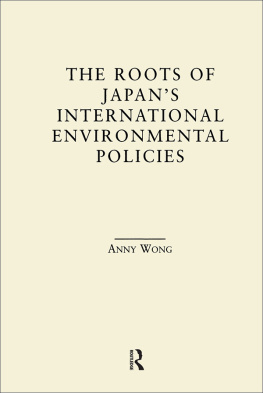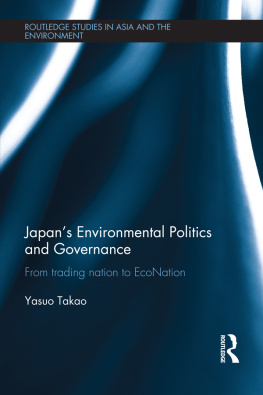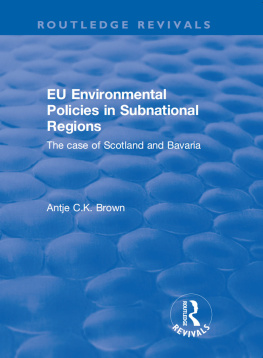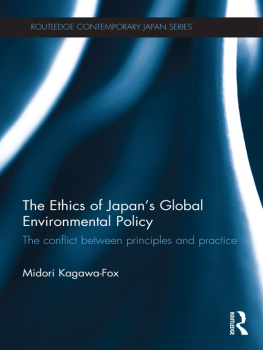E AST A SIA : H ISTORY , P OLITICS , S OCIOLOGY , C ULTURE
edited by
EDWARD BEAUCHAMP
U NIVERSITY OF H AWAII
First published 2001 by Garland Publishing, Inc.
Published 2017 by Routledge
2 Park Square, Milton Park, Abingdon, Oxon OX14 4RN
711 Third Avenue, New York, NY 10017, USA
Routledge is an imprint of the Taylor & Francis Group, an informa business
Copyright 2001 by Anny Wong
All rights reserved. No part of this book may be reprinted or reproduced or utilised in any form or by any electronic, mechanical, or other means, now known or hereafter invented, including photocopying and recording, or in any information storage or retrieval system, without permission in writing from the publishers.
Notice:
Product or corporate names may be trademarks or registered trademarks, and are used only for identification and explanation without intent to infringe.
Library of Congress Cataloging-in-Publication Data is available from the Library of Congress.
ISBN 13: 978-0-8153-3950-2 (hbk)
I was blessed with kind advice and generous support from many people throughout my doctoral program. First of all, I thank Dr. Carolyn Stephenson, the chair of my dissertation committee, for her rigorous guidance. I also thank other members of my committee, Drs. James Dator, Charles E. Morrison, James E. Nickum, and Patricia G. Steinhoff for sharing with me their scholarship and encouragement.
I extend my appreciation to Drs. Muthiah Alagappa, Haruhiro Fukui and Alvin So for their roles in various stages of my dissertation. I am, furthermore, indebted to all the people who have generously shared with me their time, knowledge, and insights in my research. The names are too numerous to mention, but I would not have been able to complete this dissertation without their valuable assistance.
For funding support, I thank the East-West Center for sponsoring my doctoral studies and the Center for Japanese Studies of the University of Hawaii at Manoa for a generous grant to launch my field study in Japan. I am also grateful to many organizations for allowing my participation in academic conferences and other activities, which helped me to refine thoughts and expand my intellectual horizons.
Last, but not least, I am most grateful to my parents for their loving support and for preparing me for lifes many challenges. I thank my friends everywhere for adding color to my life with their insights, humor, and culinary delights. Finally, a special mabalo to Sara Banaszak, my Wong family in Honolulu, and the Murooka family in Japan for opening their homes and hearts to me.
T his study draws on complex interdependence, regime theory, two-level games theory, and the bureaucratic politics model to examine foreign policy making in Japan. The focus is Japans policies towards international environmental issues, with case studies on whaling, deforestation in the tropics and transboundary acid deposition in East Asia.
This study has two objectives. The first is to investigate how interactive dynamics between domestic and international politics affects foreign policy making in Japan, particularly the countrys international environmental policies. The second is to identify motivations behind Japanese government policies towards the global environment. Whaling, deforestation in the tropics and transboundary acid deposition in East Asia are chosen as case studies because they illustrate how Japan views different kinds of international environmental problems. Each case also involves a different set of diplomatic relations for Japan, and together they present a broad outline of the ascent of environmental issues in international politics in the past three decades.
Environmental issues are useful to the study of foreign policy-making because they typically cut across conventional lines of jurisdiction in a government. Understanding motivations behind Japans international environmental policies is particularly important because Japan is second largest economy in the world and is a top donor of development and environmental assistance. In other words, Japan has significant influence to do good as well as bad for the global environment.
This study supports the view that the bureaucratic politics model is useful in identifying major domestic forces behind Japanese foreign policy and the Japanese governments views of international environmental issues. However, application of concepts in complex interdependence, regime theory, and two-level games model helps to reveal a more penetrating and complex picture of foreign policy making. Dynamic interactions between systemic and subsystemic levels open opportunities for policy actors to build transnational alliances, redefine issues and exploit issue linkagesamong other strategiesto increase their bargaining leverage at domestic and international levels. On motivations behind Japanese policies and actions towards the global environment, the end of Cold War confrontation presents new opportunities for an economic powerhouse like Japan to assert itself in international politics. Japans success in domestic industrial development, pollution control, its advanced technologies and enormous official aid program are seen by Japanese policy makers as instruments to establishing Japanese leadership in global environmental affairs. However, Japan is nowhere closer to its objective despite high hopes and billions of dollars in environmental aid disbursements. A significant part of the problem lies in disparities between Japanese views and international opinions and regimes. Japan has a rather narrow interpretation of environmental issues. As a resource poor country, ensuring energy and resource security has always been the countrys top national priorities. Thus, Japanese policies emphasize resource management for sustainable use over nature protection, and it has more proactive and progressive policies towards brown issues (e.g., energy, urban development) than green issues (e.g., biodiversity protection).
ADB Asian Development Bank
APEC Asia Pacific Economic Cooperation
ASEAN Association of Southeast Asian Nations
ASW Aboriginal Subsistence Whaling
BWU Blue Whale Unit
CCTs Clean Coal Technologies
CIFOR Center for International Forestry Research
CITES Convention on International Trade in Endangered Species of Wild Fauna and Flora
CLRTAP Convention on Long-range Transboundary Air Pollution
CO2 Carbon dioxide
COP 3 Third Meeting of the Conference of Parties to the Climate Change Convention
CSD United Nations Commission on Sustainable Development
CTP Cooperative Technical Program to Measure the Long-range Transport of Air Pollutants
DAC Development Assistance Committee
EACN European Air Chemistry Network
ECO ASIA Environment Congress for Asia and the Pacific
EEZ Exclusive Economic Zones
EMEP Cooperative Program for Monitoring and Evaluation of Long-Range Transmission of Air Pollutants in Europe
ESCAP United Nations Economic and Social Commission for Asia and the Pacific
ETP Emissions Trading Program
FAO United Nations Food and Agriculture Organization
FGD Flue Gas Desulfurization
FoE Friends of the Earth
FSC Forest Stewardship Council
G-7 Group of Seven (grouping of developed economies)
G-77 Group of 77 (grouping of developing countries)
GATT General Agreement on Tariffs and Trade











